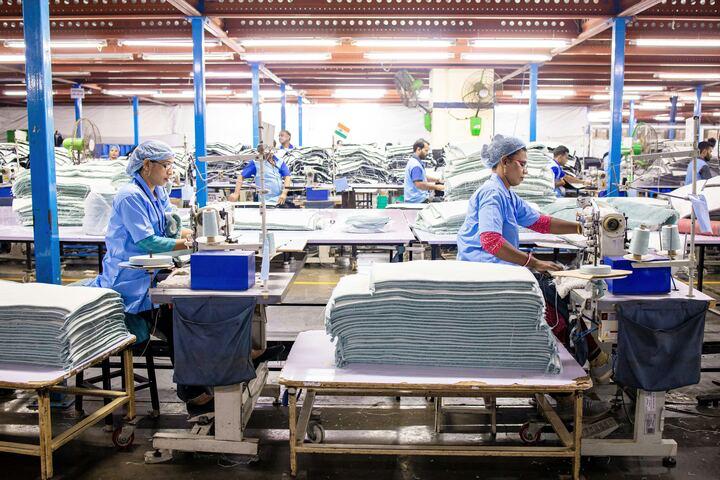
430 million people are employed in the textile industry globally, representing around 1% of the global population. Working conditions in textile factories, especially in major hubs across South and Southeast Asia, remain precarious with low wages, lack of job security, and unsafe work environments. The 2013 Rana Plaza disaster in Bangladesh, where over 1,100 garment workers lost their lives due to unsafe working conditions, triggered global transformation in the industry. The International Accord and the Bangladesh Agreement on Health and Safety in the Textile and Garment Industry both underscore the urgent need for better oversight and accountability within global supply chains. Along with its economic significance, the sector is also one of the largest contributors to environmental harm, responsible for 20% of global clean water pollution through dyeing and finishing processes.
A path forward: Data and transparency
Transparency along the value chain about workers’ conditions and environmental impacts is essential to build systems that incentivise good practices or invest in improvements in those conditions. However, getting reliable data about conditions and factories can be difficult. Existing mechanisms that enable this data collection and flow often rely on external audits and third-party data collection, which can lead to “audit fatigue” and unverified information. Moreover, these approaches tend to overlook a critical stakeholder—the workers themselves.
New possibilities to improve data collection, reduce costs, and thus improve sustainability have arrived with the introduction of digital technologies, automation, and data in industrial processes. Sharing of data between global textile stakeholders can help identify ethical and environmental issues within supply chains while providing a mechanism for continuous monitoring and improvement.
To that end, shared data ecosystems have been recognised as a powerful opportunity to build rules and relationships between stakeholders—including workers—to build the trust and incentives necessary for all actors to collect and share access to data which relates to their work. Efforts such as the Global Textiles Transparency Governance Initiative are building these shared data ecosystems by leveraging scalable and secure data flows to improve transparency and traceability within textile supply chains. This involves including workers in decisions on the rights and rewards for data about workers and factories.
These efforts can create more trustworthy, actionable, and sustainable solutions. Worker-led data practices can shed light on ethical sourcing, supply chain transparency, and working conditions while giving workers greater agency over how their data is collected, used, and shared. Collective accountability and sector-wide resilience can thus be enabled via worker-oriented data governance approaches.
Initiatives by worker unions and collectives on socialising principles of worker data rights or joint efforts such as the Bangladesh Accord for worker safety have all begun to recognise the value of collective action in the larger discourse around sustainability and good governance.
Practical Steps
In collaboration with GIZ’s Global Textiles Transparency Governance initiative, Aapti Institute will facilitate participatory workshops in India and Bangladesh. These workshops aim to engage with textile and garment worker unions and collectives within digitised manufacturing units to:
- Co-learn and collectively articulate the value of data for workers and the sector
- Co-design worker-led data governance mechanisms that reflect workers’ needs and priorities
By embedding worker perspectives into global data governance practices, this initiative aims to build stronger, more equitable textile value chains, where data can more effectively feed into compliance while emphasising the need to improve labor conditions and environmental outcomes.
Aapti’s approach: Co-designing data governance with workers
Aapti will rely on a participatory and iterative approach to engage with workers and collaborate on governance models that empower them to exercise greater agency over their data and more efficiently input data for enhanced transparency in global supply chains. The workshops will use interactive, hands-on methods – such as mapping data journeys through textiles – to align data governance processes with the lived experiences of workers. To account for existing power dynamics with and between workshop participants, the Aapti team prioritise reflection and structure the workshops through one-on-one and group interactions to create an environment of ease and trust.
The outcome will be a framework that imbibes worker perspectives for data governance such that it enhances supply chain transparency and creates a more sustainable and equitable textile industry. Importantly, the insights and governance models developed through this initiative can be adapted and applied to other industries with global supply chains where similar challenges around transparency, compliance, and worker agency persist. For instance, the European Union’s efforts to account for sustainability in forest produce supply chains would be greatly benefitted by a holistic stakeholder approach with appropriate participation from local indigenous communities.
As this initiative unfolds, we are eager to engage with experts working at the intersection of digital supply chains, shared data ecosystems, and garment worker welfare. If you or someone you know is working on these issues, please reach out to us at [email protected] – we would love to exchange insights and explore potential collaborations.


